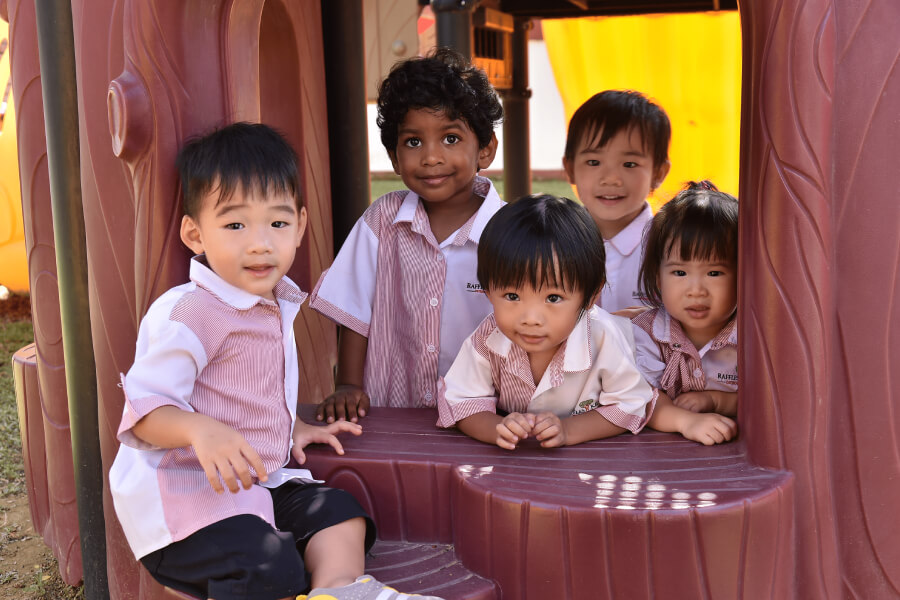Having a healthy range of social skills is important for young children as they grow to interact and form relationships with others. It can help them make friends, have conversations, participate in group activities, and thrive in social settings. It can also improve children’s mental capacity and cognitive abilities, as well as their overall mental health and well-being.
As children grow and develop their social skills, it takes ongoing efforts to learn and strengthen these skills. Providing a wide range of opportunities for children to interact and play with other children encourages them to share, empathise, collaborate and cooperate with their peers. It is one of the social benefits of sending children to childcare centres and kindergartens as they get to engage in various social interactions under the guidance of experienced preschool teachers.
Here are some of the most important social skills that should be instilled in your child from an early age:
1. Active listening
Being able to communicate clearly and effectively begins with active listening. It is more than just hearing what others are saying, it is about understanding and thinking about what is being said. Listening plays an important role in school when your child has to listen to what teachers are saying and act on it actively by absorbing information and taking down notes.
Once your child practises active listening, they will grow to understand and empathise with people more as well. For younger children, this skill is one of the building blocks to the development of all the relationships in their lives, from parents to teachers to their peers. In adulthood, it becomes crucial to maintain healthy bonds of all kinds.
Tell your children stories, read to them, and ensure clear communication to cultivate listening skills. You can even have them repeat your instructions back to you and check for any missing details.
2. Mindfulness
Practising mindfulness allows children to develop long-lasting social relationships. For instance, a child taking turns and sharing what they have without prompting encourages the ability of a child to connect with others.
Similarly, manners are essential for your child to grow into a socially adept adult. Saying “please” and “thank you” can create a great impression on their peers, teachers, and other adults.
Teaching children manners requires patience and guidance, as they are new to social norms and everyday practices – especially if they’re younger. At these times, as a parent, you have to reinforce proper manners so that they get familiarized with them.
Instilling healthy respect for personal space is also vital for children. Different children have different levels of comfort with other people. Some have no qualms about sticking very close to their peers or adults. While this may seem harmless at first, it’s important that they learn about boundaries and how to respect them.
3. Cooperation
Children who are unable to follow instructions may face many negative consequences. They may even be miscategorised as students who behave badly on purpose. As such, children need to learn how to take directions and follow cues from a young age.
While giving instructions, keep in mind to offer them leniency if they make mistakes. It’s entirely natural for children to get distracted or give in to impulsive behaviour. Just gently correct them when they veer off the path.
Another essential component of cooperation is working together with peers. Teamwork means your child will have to learn to cooperate with peers to get what they want. They must maintain a certain level of mutual respect and contribute equally to attain this goal.
People develop good cooperation skills early on to integrate into their greater community. They can then discover if they are more predisposed to leadership or if they would rather take directions.
4. Self-expression
Last but not least, encouraging your child to express themselves is the first step to enhancing their communication skills. Children have big emotions and they may not know how to navigate and express themselves at times.
As children engage in conversations, having eye contact is the first step in connecting with the other person. Proper and sufficient eye contact helps to communicate your message more effectively. If your child avoids making eye contact, try to ease them into the habit by starting more conversations and demonstrating the skill.
Children will also have to learn to manage conflict constructively in order to express themselves healthily and maintain social relationships. At a young age, it’s very easy to feel overwhelmed by anger or disappointment and react instinctively. Hence, it’s critical that they learn to calm themselves down in order to respond appropriately to conflict. They have to be able to recognise what they’re feeling and why they’re feeling it. From there, caregivers can provide a safe space for them to calm down and teach them coping skills such as taking deep breaths They can even come up with solutions for the issue at hand with your guidance. Eventually, they’ll be able to manage conflict without external influence.
Conclusion
Growing up can be complicated for most, so parents must provide children with all the social skills they need to navigate the world. With this, they’ll be able to form relationships better, become more empathetic, and have an easier time achieving their goals.
Raffles Kidz is one of the best kindergartens in Singapore that takes the holistic development of your child seriously. Our all-rounded curriculum helps ensure that children are equipped with the skills needed to pursue varied interests and grow into more creative and social learners. Book a tour with us today to find out more!


